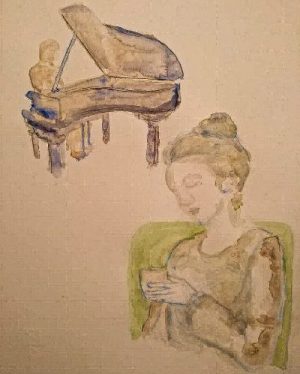I’m so sorry, dear, you can’t imagine how much. I’ll see you soon, all right? So Betta greeted you on the phone when she couldn’t reach you to a dinner or a tea party at someone’s home.
A philosophy graduate from the Università Statale of Milan, she had stayed a few years in Heidelberg for a PhD. and then she had come to Palermo to be a creative.
It was not clear to us what she actually did, but she was always busy with meetings, conferences, departures to Rome, to the north or even abroad. We also knew that she didn’t miss any of the most important marches to save the planet from some of the major risks it was running. An environmentalist, animalist, vegan, no global, no vax, no tav, she was all of everything. When she came and see you at home, you didn’t know where to hide the pack of plastic cups that you kept in the cupboard in case there were water scarcity problems or you had the flu and had not the energy to do the washing up. You would have liked to show her a certificate of good behaviour for playing your part in the fight for a better world though in silence. But this kind of document did not exist and Betta, even if you had displayed one in front of her face with all the possible stamps on it, would have looked at you straight into your eyes and, strucking you down with her beautiful smile, would have told you: oh, don’t worry, each of us does what we can. Whatever she and her colleagues were dealing with, it was always something about a small group of eccentrics who were doing a thing putting their heart into it not being able anymore to find time even for their basic needs. She said this thing about the eccentrics, smiling and looking downwards as if she were speaking to herself and also shaking her head slightly as mothers do when they talk about the mischiefs done by their children, who are on the other hand des enfants prodige. Like any creative deserving respect, Betta never wore jumpers of her size; she always appeared with fake or real homemade sweaters with sleeves that covered half her hands. Wearing low-necked tops underneath, she made her envelop by a thick and soft wool scarf that left her décolleté uncovered.
Her hair, long and fine, was always wrapped in a sort of chignon fastened with an elastic band or even a pencil; what was important was that it resembled as much as possible some kind of tools she had come across while doing creative things. Once she had secured it with a brush, thus I gave her a resentful look: she had always been saying she was not able to draw even an O with a cup, let alone painting. And oh, not the brush, please, that could not become a part of a disguise!
One day she came and see me because she needed a 1972 issue of the Quaderni del Conoscitore di Stampe; after so many years that she had been visiting my home, the last time she came she realized that I had a myriad of interesting things, so she “promised” me that she would sometimes come and rummage around for a work that she had been given. She had arrived half an hour earlier than the time we had agreed on and I was still dealing with an informal painting that I was trying to tame. I had opened the door in my coat, my hands dirty with colour and some clips on my hair. Cool!, Awesome!, she had repeated excited about my work clothes and my appearance, peeking into the study where there was my easel and from which a pungent smell of turpentine came. While I was going to the bathroom to wash my hands so that I could take the magazine she would borrow from me, she had gone into the living room straight to the library. Would you like a cup of tea? I had asked her while the water was flowing into the sink. She had answered yes, she‘d love to, mumbling something I hadn’t heard well about the latest variety of green tea she had tasted during one of her trips abroad. The only thing I liked to do in her company was having a cup of tea. She used to taste its flavor thoroughly. Looking at her while she brought the steaming cup to her lips, I always felt that she got the same restorative pleasure from that drink as I did. It didn’t happen with anyone else.
It was a pleasure that started from an olfactory perception of every nuance of that effluvium, which, slowly emanating from the porcelain, was able to wrap whoever abandoned themselves to it in a reassuring embrace and later continued inside, once the precious liquid, reddish and sharp, gave off its heat radiating every organ. I also liked her long white fingers, whose nails were painted with vermilion enamel, on the cup. We had drunk a delicious black cinnamon tea that a friend of mine had recently brought me from Canterbury, accompanied by fragrant orange biscuits. Considered in the delightful role of a passionate tea drinker, it had become easier not only lending her a magazine I cared about, but also a book, one of those which used to be defined as “cult”, that she had admitted she had never read. “Thanks for the delicious tea, I really needed it, I hadn’t been drinking a cup of tea sitting comfortably on a sofa for months” she had said with one of those bright smiles she made use of to mean that you had saved her life with a little gesture. Then, with a long sigh, she had added “Lucky you …”. We had greeted each other with a hug that she had emphasized with her usual hateful short massage on the back pretending to mean ” you are so dear to me, I’d stay here for centuries”, then I had opened the door and waited for the lift to swallow her up (the spell produced by the tea was visibly coming to an end).
Betta was unquestionably convinced that she was part of the World Best Youth and considered herself, her colleagues and few other young local intellectuals as the only persons entitled to think of themselves as being part of an élite that possessed all the necessary (and even more) requirements to contribute to the civil and cultural growth of Palermo and of the whole planet.
One evening the others and I had let her know that we would go to the cinema together; she had answered that unfortunately she could not join us. We had just sat down when one of us noticed that she had appeared with a friend. Same kind of coat on long skirts up to the ankles, same handmade scarves around their necks, same boots with thick rubber soles, same big cotton bags with long shoulder straps. We had waved at her and when she had seen us, she had opened her eyes wide with wonder,meaning from behind her John Lennon glasses “What are you doing here?”. The film was the first one in the schedule of a festival on the great Japanese director Yasujiro Ozu. Betta could not believe that we poor nerds who had graduated from the best universities throughout Europe and had ended up teaching in Italian high schools, could be interested in a Japanese film that would be watched in its original language and in black and white. The world was showing little signs of progress and Betta, looking at it from above, congratulated offering it her snobbish and distant smile.
Once we met her at the airport. She was leaving to Bruxelles. Regretting she had not been able to attend my boyfriend’s last concert at the Conservatorio,she had asked him to perform for her playing the piano in the departures hall. All the while she had been listening with an ecstatic look, then her flight had been called and she had run away saying mechanically “Bravo, I’m terribly sorry today that my plane is not late”. I had given Andrea a very bad look, he had been an idiot and had deserved her condescending behaviour.
Like any good intellectual, Betta had a habit and hers was the passion for shoes. Sometimes I liked a pair of them, but I avoided asking her where she had bought them: she could answer, with a desolate smile, that it was the last pair she had found in a second-hand shop in Bremen or some other interesting place. In short, the less Betta spoke (and above all, the less she smiled) and the better it was for everyone.
On a winter evening, while we were all having dinner at my home, we remembered her after Pietro and Giovanna’s daughter had expressed her wish to enrol on a PhD in Germany. We looked at each other in silence for a few seconds and then we burst out laughing.
Why had we started calling her “la Betta”? Well, because once she had tried to phone one of her colleagues from Milan University and had told the girl’s mother to tell her daughter “la” Betta would like to talk to her!
She did not live in Palermo anymore; where she was, what she was doing, none of us could tell. Little by little she had abandoned us to our destiny of uncool people, sometimes interesting, but nevertheless fond of a life spent far from the European cultural epicenters, typical of a southern city like ours. To me, it was almost funny, in comparison to Betta, feeling all that attachment for a place that in fact might be sometimes considered a bit unsatisfactory even by me (who was not originally from there).
In the end, however, I was convinced that the guys like her would have been feeling wasted everywhere, with those faces of know-it-all missionaries who distributed culture here and there to help raise a little the level of so many less fortunate people.
But the world was spinning like this, and it was still very difficult at all latitudes to find someone who would appreciate a good cup of tea and had also a beautiful soul.








